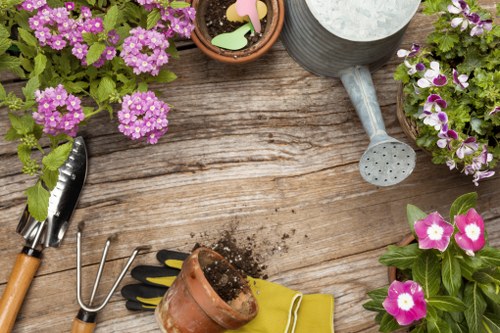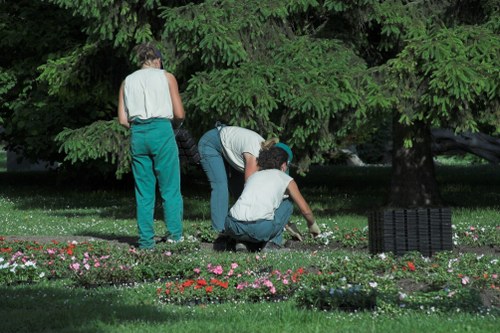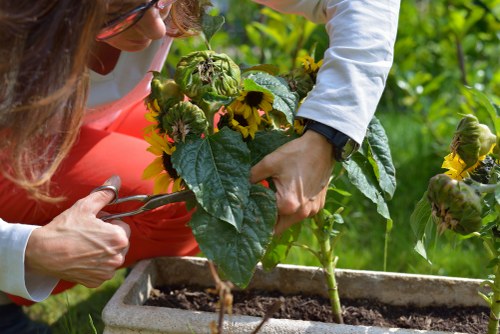Comprehensive Guide to Garden Maintenance in Forest Hill
Introduction to Garden Maintenance

Maintaining a beautiful garden in Forest Hill requires a combination of knowledge, dedication, and the right techniques. Whether you're a seasoned gardener or a beginner, understanding the specific needs of your garden helps in creating a lush and vibrant outdoor space.
Forest Hill's unique climate and soil conditions play a significant role in garden maintenance. By tailoring your gardening practices to suit these environmental factors, you can ensure the health and longevity of your plants.
In this article, we'll explore essential garden maintenance tips, seasonal care routines, pest management strategies, and more to help you achieve a thriving garden in Forest Hill.
Understanding the Climate of Forest Hill

Forest Hill experiences a temperate climate with distinct seasons, which influences gardening practices throughout the year. Understanding the local weather patterns is crucial for effective garden maintenance.
The region receives ample rainfall during the spring and autumn months, making it ideal for planting a variety of flora. However, summers can be hot and dry, necessitating proper watering strategies to keep your plants healthy.
Winter brings cooler temperatures and occasional frost, requiring gardeners to take protective measures to safeguard sensitive plants. By adapting your maintenance routine to these seasonal changes, you can maintain a resilient garden year-round.
Soil Health and Preparation

Healthy soil is the foundation of a thriving garden. In Forest Hill, the soil composition can vary, so it's essential to test your soil's pH and nutrient levels before planting.
Amending the soil with organic matter, such as compost or manure, improves its structure, enhances drainage, and provides essential nutrients to plants. Regularly aerating the soil prevents compaction and promotes root growth.
Mulching is another effective practice that helps retain moisture, regulate soil temperature, and suppress weeds. Choose organic mulches like bark or straw for added benefits of decomposition and nutrient release.
Plant Selection and Care

Selecting the right plants for Forest Hill's climate ensures better growth and easier maintenance. Opt for native and drought-resistant species that are well-adapted to local conditions.
Regular pruning is vital for maintaining plant health and encouraging new growth. Remove dead or diseased branches to prevent the spread of pests and diseases.
Fertilizing your plants according to their specific needs promotes robust growth and vibrant blooms. Use a balanced fertilizer to provide essential nutrients without overloading the soil.
Pest and Disease Management

Protecting your garden from pests and diseases is crucial for maintaining plant health. Implement integrated pest management (IPM) strategies to minimize the use of chemical pesticides.
Encourage beneficial insects like ladybugs and praying mantises that naturally control harmful pests. Regularly inspect your plants for signs of infestation and take prompt action when needed.
Proper sanitation, such as removing fallen leaves and debris, reduces the habitat for pests and prevents the spread of diseases. Additionally, selecting disease-resistant plant varieties can significantly decrease maintenance efforts.
Watering Techniques
Efficient watering is essential for a healthy garden. In Forest Hill, it's important to adjust your watering schedule based on seasonal rainfall and plant requirements.
Drip irrigation systems are an excellent way to provide consistent moisture directly to the plant roots, reducing water wastage and minimizing the risk of fungal diseases.
Watering in the early morning or late evening helps minimize evaporation and ensures that plants receive adequate hydration. Always check soil moisture levels before watering to prevent overwatering.
Seasonal Garden Maintenance
Adapting your garden maintenance routine to the changing seasons ensures year-round garden health.
- Spring: Focus on planting new flowers and vegetables, pruning shrubs, and preparing soil for the growing season.
- Summer: Implement consistent watering, mulching, and pest control to keep plants thriving.
- Autumn: Clean up fallen leaves, plant perennials, and prepare your garden for the cooler months.
- Winter: Protect sensitive plants with mulch or coverings and plan for the next gardening season.
By following a seasonal maintenance schedule, you can address specific garden needs at the right time, promoting longevity and beauty.
Tools and Equipment for Effective Maintenance
Having the right tools makes garden maintenance more efficient and enjoyable. Essential tools for Forest Hill gardeners include:
- Pruning Shears: For precise trimming of branches and stems.
- Garden Fork: Ideal for aerating soil and mixing compost.
- Watering Tools: Such as hoses, sprinklers, and drip irrigation systems.
- Hand Tools: Including trowels, weeders, and cultivators for various planting and maintenance tasks.
- Lawn Equipment: Like mowers and trimmers for maintaining grassy areas.
Investing in high-quality tools extends their lifespan and improves your efficiency in garden tasks.
Sustainable Gardening Practices
Adopting sustainable gardening practices not only benefits your garden but also the environment. Consider the following approaches:
- Composting: Recycle garden and kitchen waste to create nutrient-rich compost for soil enhancement.
- Rainwater Harvesting: Collect and utilize rainwater for irrigation, reducing reliance on municipal water sources.
- Native Plants: Choose native species that require less water and are more resistant to local pests.
- Organic Practices: Avoid synthetic fertilizers and pesticides in favor of natural alternatives.
Implementing these sustainable methods promotes a healthy ecosystem and reduces your garden's environmental footprint.
Challenges of Garden Maintenance in Forest Hill
Gardening in Forest Hill comes with its own set of challenges. Understanding and addressing these issues is key to successful maintenance.
- Pest Infestations: Common pests can damage plants if not managed properly.
- Soil Quality: Varying soil types may require specific amendments for optimal plant growth.
- Weather Extremes: Sudden changes in weather can stress plants and affect their health.
- Time Management: Balancing garden maintenance with other responsibilities can be challenging.
By proactively addressing these challenges, you can maintain a resilient and beautiful garden throughout the year.
Professional Garden Maintenance Services
For those who prefer expert assistance, professional garden maintenance services in Forest Hill offer comprehensive care solutions tailored to your garden's needs.
Professional gardeners provide services such as:
- Regular lawn care and mowing
- Pruning and trimming of trees and shrubs
- Weed control and pest management
- Soil testing and fertilization
- Landscape design and plant selection
Hiring professionals ensures that your garden receives the highest level of care, allowing you to enjoy a beautiful outdoor space without the hassle.
Contact us today to schedule a consultation and take the first step towards a flourishing garden in Forest Hill.
DIY Tips for Garden Maintenance
If you prefer a hands-on approach, here are some DIY tips to keep your Forest Hill garden in top shape:
- Regular Weeding: Keep weeds at bay by removing them regularly before they spread.
- Deadheading: Remove spent flowers to encourage new blooms and maintain plant appearance.
- Mulching: Apply a layer of mulch to conserve moisture and suppress weed growth.
- Crop Rotation: Rotate plant families annually to prevent soil depletion and reduce pest buildup.
- Composting: Start a compost pile to recycle organic waste and enrich your soil.
Implementing these DIY strategies can significantly enhance your garden's health and beauty with minimal investment.
Final Thoughts on Garden Maintenance
Effective garden maintenance in Forest Hill involves a blend of proper planning, regular care, and the right techniques tailored to the local environment.
By understanding the climate, enhancing soil health, selecting suitable plants, and implementing sustainable practices, you can cultivate a garden that thrives year-round.
Whether you choose to manage your garden independently or seek professional assistance, consistent effort and attention will yield a stunning outdoor sanctuary.
Book your service now and transform your garden into a vibrant and healthy space.